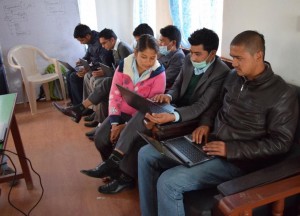Possible: Improving health care through technology
By AdministratorIn health care systems it is common for physicians to rely on patients’ medical histories when making treatment decisions. Knowledge of preexisting conditions can help doctors make accurate diagnoses. An electronic medical record (EMR) is a tool used by health care professionals to reliably record, share, and analyze the extensive medical histories of patients to improve treatment.
Possible, Foundation Beyond Belief’s current Poverty and Health beneficiary, in coordination with its partner organization ThoughtWorks, recently launched rural Nepal’s first EMR system. Using EMRs is a relatively new practice around the world, present in less than half of U.S. doctors’ offices. Possible’s EMR system will improve patient care by eliminating errors and difficulties inherent in recording medical histories on paper. Paper histories are easily damaged, unsecure, and frequently illegible. EMRs, despite requiring a significant monetary investment in technological infrastructure, offer solutions to all these problems along with the added benefit of increased access. Previously, Possible’s dedication to follow-up care by clinics and community health workers meant immediate access to a patient’s medical record was impossible. As the EMR extends throughout Possible’s network, workers in villages will have reliable, timely access to accurate medical information to improve care and maintain confidentiality.
In addition to medical histories, community clinics will have access to the experience and advice of medical experts from hospitals in distant urban centers. Those experts will be able to receive and read lab reports and x-rays and offer their recommendations instantaneously. It will be an incredible resource once fully implemented. Due to Possible’s commitment to the principle that “Efficiency Is a Moral Must,” there will be a period of extensive training in the use of the EMR for its workers. Dedication to effectively managing the system as it is integrated into patient care will take time and substantial effort. Over the next year, that training and integration will take place at the main hospital hub, with the goal of extending the system to the clinic and community level in 2016. Throughout the process, team members will be trained in basic computer literacy and how to effectively use the system to make quicker, smarter medical decisions.
As Possible continues to provide high-quality, low-cost health care to the people of Nepal, Foundation Beyond Belief continues to support its collaborative efforts to build community-based relationships throughout the region. Finding new ways to continue to augment the Nepalese health care system for the benefit of the nation’s underserved is only the most recent example of Possible working compassionately for humanity.

